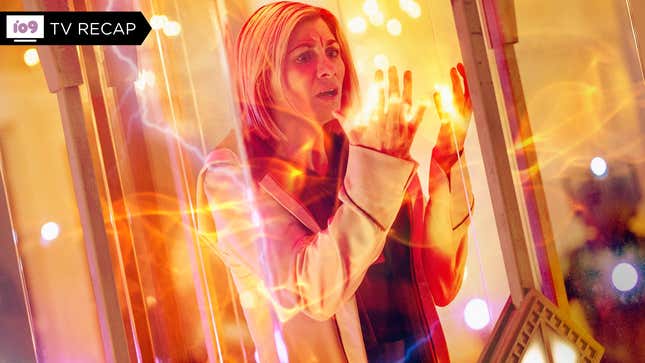
The era of the 13th Doctor is over, and it went out how ultimately much of Chris Chibnall’s time as Doctor Who’s showrunner went over the last four years: with moments of brilliance outshined by a plodding, unwieldy mess of narratives that threatened to drag its excellent star down with it. In that way, it’s perhaps a fitting finale, if an unjust one.

“The Power of the Doctor,” the final outing of Jodie Whittaker’s 13th Doctor and Chris Chibnall’s run as Doctor Who’s showrunner, is, like a lot of the duo’s recent escapades in time and space, a difficult piece of television to write about. Endings are hard, especially Doctor Who ones, where the mystical process of Time Lord regeneration all but guarantees that no matter how strong the adventure before it, an end will always be outshadowed by the new beginning that comes immediately after it. They’re even harder in Doctor Who’s revived era, where the exit of one Doctor and the arrival of another has, every once in a while, also coincided with the departure of the show’s flagship creative steward, turning the story into not just the end of a Doctor’s incarnation, but a treatise on an entire period of Doctor Who’s history.
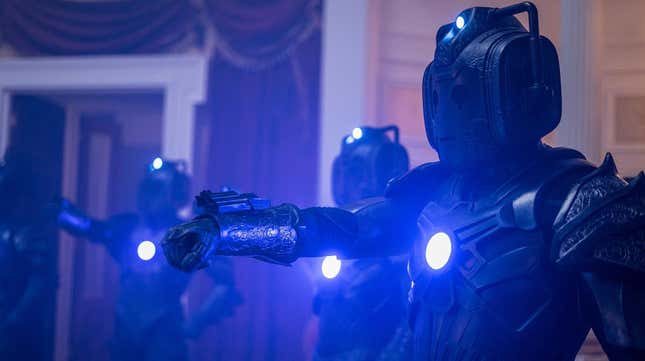
All this and more hangs heavily on the shoulders of “The Power of the Doctor,” an endcap on a tumultuous period of Doctor Who already heavily shadowed by the bananas potential of the returning faces that have long been heralding its future before we reached this end. There are few finales that could navigate the complex, nuanced weirdness of the current state of Doctor Who and come out largely immaculate. But the fatal problem with “The Power of the Doctor” is that for the vast majority of its burdensome 90-minute runtime it does not even try, flinging cameos, story threads, and scenes at a wall and desperately praying that they will stick—and for the most part, they don’t.
To attempt to explain what happens in “The Power of the Doctor” narratively is an exercise in futility. Which is presumably why at the apex of its mess—a moment where the Master (a returned Sacha Dhawan, now having given up any attempt to be menacing in favor of, like all good Masters before him, consuming every piece of scenery imaginable by a BBC budget) sets the stage for a zany attempt to force the Doctor to regenerate into himself and breaking out into an extended dance sequence set to Boney M’s disco classic “Rasputin”—is heralded by the Master attempting to explain why the preceding 45 minutes of the episode had happened to the Doctor and the audience.
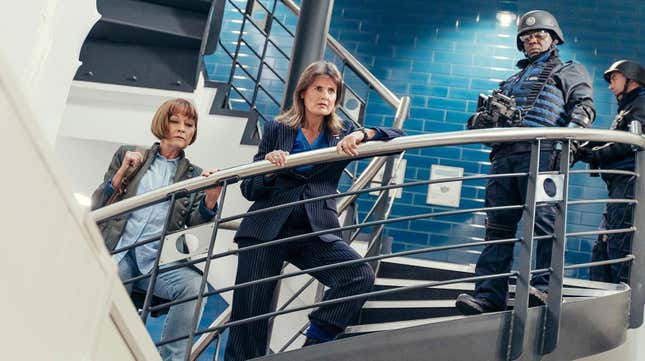
A train flying through space invaded by Cybermen, barely arrived companion Dan rapidly exiting the series with little in the way of emotional payoff, renegade Daleks invading earth, a planet in orbit made out of Cybermen Stuff, UNIT and not one but two returned companions (Janet Fielding and Sophie Aldred as Fifth Doctor companion Tegan Jovanka and Seventh Doctor companion Ace, respectively), missing paintings and seismologists, and the Master pretending to be Grigori Rasputin in early 20th century Siberia... all of these things unfold in as incoherent a manner as possible. Chibnall’s fondness for title cards with locations and years on them in an attempt to manufacture scale without actually showing scale is only matched for his fondness for plot threads that can barely flow with each other, as the Doctor and Yaz race across space and time to try and figure out what’s going, dragging the audience along the way. Scenes barely cohere from one moment to the next, and characters figure things out not by actually working them out from clues, but by just simply loudly stating what’s meant to happen or is in the process of happening, and none of these seven different plot threads get any time to develop because we’re flipping between them at at such a rapid, muddled pace.
Nothing lands emotionally, despite the fact we are constantly shouted at that these things are all dire and that the Doctor is facing her toughest battle yet. Whittaker barely gets to play to her strengths as she is shuffled between being flummoxed by each newly introduced plot thread. No time is spent developing these kernels of ideas—which, standalone or in a much smaller dose, might be interesting episodes in and of themselves, but not here—so nothing ever feels exciting or satisfying. And then they all fall apart in the aforementioned scene, where the Master simply explains, before his dance sequence, that everything was his idea. Why? Because he said so. And again, there’s no satisfaction for the audience here, as if this was a grand puzzle you could conceivably put together before the Master reveals his, well, Master plan—because nothing is given the time to make sense. Why does any of this matter? The Master did it. So what?
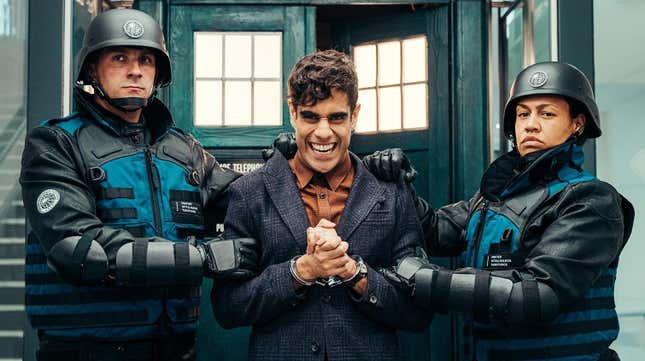
This might all sound like I’m about to describe this reveal, and the impending forced Master-ification of the Doctor, as a turning point where “The Power of the Doctor” might get good, but alas. It just keeps adding more plot threads. The Master’s goal? Become the Doctor and seemingly kill their regenerative line in the process, so he can proceed to slander the Doctor’s name across space and time. The UNIT stuff with Ace and Tegan? Now that’s a Cyberman invasion of Just One Building on Earth, lead by “Last Cyberman” Ashad from a few seasons ago (he got better, cloned by the Master, don’t worry about it, because “The Power of the Doctor” certainly doesn’t after stating this). Remember Vinder from last year’s terrible season, Flux? He’s also here on the Cyber Planet, because it turns out that the child the Cybermen kidnapped on that train 45 minutes ago is actually sentient energy powering it. Meanwhile the 13th Doctor is shunted to the “Edge of Eternity,” the limbo all Time Lords apparently walk through during the process of regeneration to have a chat with a phasing facsimile of their First, Five, Sixth, Seventh, and Eighth incarnations—the first of plenty wild, random cameos from Doctor Who’s past. She’s also showing up as a sentient AI on the TARDIS to help the abandoned Yaz, and as implanted holograms for Tegan and Ace as they’re shunted into separate plotlines to stop the separate Dalek and Cyberman threats.
Once again, individually, all these threads might make for compelling Doctor Who episodes. And there are ideas here that, for a brief moment in the muddling malaise, shine with a brilliant potential that just makes their larger messiness even more frustrating. The idea of a limbo for Doctors where their past selves, so horrified by the Master’s vandalizing of regeneration, come together to pull the 13th Doctor back from the brink is a wonderful bridge across so many eras of the show. Giving Janet Fielding and Sophie Aldred, two actors whose companions unjustly exited their times on the show, the chance for one more scene opposite their respective Doctors and give Tegan and Ace a chance to heal their frayed relationship with the Doctor, delivers two incredibly poignant moments in an episode of desperate need of them. Even the Master’s supposed grand plan—becoming the Doctor just to defame them across the cosmos—is a bold and wonderfully Master-esque scheme. But these are just individual moments, flickering in and out of brilliance before the incoherence that drives “The Power of the Doctor” sweeps them away too.
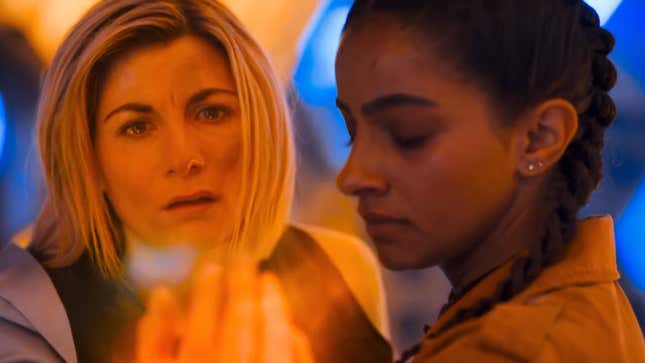
The final insult perhaps comes with the fact that for all the time “The Power of the Doctor” spends haphazardly chasing between all of these plots, it brings them all together and deals with them all in the space of five to 10 minutes, after Yaz and Vinder manage to revert the Doctor back to herself with a handwave, letting her gleefully hop around in the TARDIS and pick up the myriad companions strewn across these far-flung plotlines. Nothing feels satisfying, because it just feels like a checklist, and no one feels anything about their resolution in the story because they’re there to be scooped up and plopped into the next handwave. And after all that? It’s only then that something actually happens to the Doctor to cause her long-fated regeneration—almost as an aside more than anything else. As the Doctor checks off “stop that Cyber planet from existing” from her list of things to do, a stray laser beam from the sentient energy creature from the start of the episode catches both the Doctor and the Master (did I mention the Master was still alive after the whole regenerative body switcheroo? Anyway, yeah), seemingly mortally wounding them both.
It’s only here that “The Power of the Doctor” deigns to remember it’s a farewell to the latest version of its titular hero, and the great frustrations of the preceding 70 minutes give way to an end that, on the whole, feels much more earned than anything that came before it. Accepting her end, the Doctor and Yaz share one last moment together, brushing on the romantic feelings they have for each other but sadly altogether too cowardly to actually do more than brush up on them. Parting ways one last time, it’s revealed to Yaz (thanks to a passing by Graham and Dan) that they and other past companions of the Doctor—Ian Chesterton, Mel Bush, Jo Grant, Tegan, and Ace among them—have set up a support group for past friends of the Doctor to share their stories, love, and grief with each other, the power of the Doctor themselves at last becoming apparent. Whittaker’s final moments in her regeneration are likewise touching, as the Doctor’s final duty is a fitting goodbye to her TARDIS—a wonderful mirror to an era that started with her flung from it—as she takes it to see one last sunrise before she herself burns with the regenerative fire of a star.
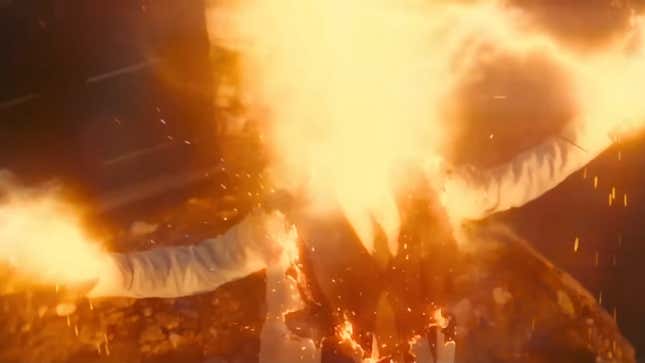
It’s almost enough to make the rest of “The Power of the Doctor” worth it, these last few moments, but perhaps in the most fitting move of all for an era defined by Whittaker’s brilliance often being undercut by the moray of messing storytelling thrust upon her, even her final moments rob her of the true spotlight—as she burns away not to reveal Ncuti Gatwa as her successor, but the returned David Tennant. And “burn away” feels like an apt descriptor here, not just for the regeneration energy cascading through the Time Lord, but the fact that even the Doctor’s very clothes burn away, replacing them with an outfit evocative of the Tenth Doctor’s prior chosen look. It’s as if even the tradition of the past Doctor’s clothes lasting at least part of an adventure beyond them was too much credit to give, as we rush along into the nostalgic return of one of Doctor Who’s most beloved stars, all “what what what”-ing and recognising their own familiarity.
And so, the 13th Doctor’s era ends, concluding in a manner similar to much of her time in the TARDIS: with a story struggled to grasp what made her such a compelling incarnation in the first place, burdened with confusing spectacle over an actual heart. As our eyes now look to the future of Doctor Who—filled with nostalgia and refreshment alike—it’s perhaps for the best that we do as we’re encouraged, and not dwell upon the mistakes of the past. Maybe the real power of the Doctor is to simply accept the change given to us, and move on as quickly as Doctor Who itself has into a new adventure.
Want more io9 news? Check out when to expect the latest Marvel and Star Wars releases, what’s next for the DC Universe on film and TV, and everything you need to know about House of the Dragon and Lord of the Rings: The Rings of Power.